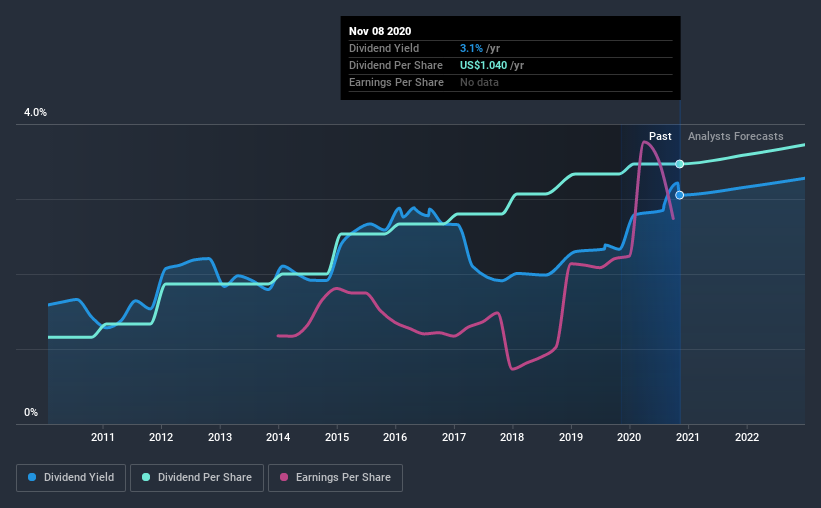Is It Worth Considering National Instruments Corporation (NASDAQ:NATI) For Its Upcoming Dividend?

Some investors rely on dividends for growing their wealth, and if you're one of those dividend sleuths, you might be intrigued to know that National Instruments Corporation (NASDAQ:NATI) is about to go ex-dividend in just three days. You will need to purchase shares before the 13th of November to receive the dividend, which will be paid on the 7th of December.
National Instruments's upcoming dividend is US$0.26 a share, following on from the last 12 months, when the company distributed a total of US$1.04 per share to shareholders. Last year's total dividend payments show that National Instruments has a trailing yield of 3.1% on the current share price of $34.08. Dividends are an important source of income to many shareholders, but the health of the business is crucial to maintaining those dividends. As a result, readers should always check whether National Instruments has been able to grow its dividends, or if the dividend might be cut.
View our latest analysis for National Instruments
If a company pays out more in dividends than it earned, then the dividend might become unsustainable - hardly an ideal situation. National Instruments is paying out an acceptable 68% of its profit, a common payout level among most companies. Yet cash flows are even more important than profits for assessing a dividend, so we need to see if the company generated enough cash to pay its distribution. It paid out 106% of its free cash flow in the form of dividends last year, which is outside the comfort zone for most businesses. Cash flows are usually much more volatile than earnings, so this could be a temporary effect - but we'd generally want look more closely here.
National Instruments paid out less in dividends than it reported in profits, but unfortunately it didn't generate enough cash to cover the dividend. Cash is king, as they say, and were National Instruments to repeatedly pay dividends that aren't well covered by cashflow, we would consider this a warning sign.
Click here to see the company's payout ratio, plus analyst estimates of its future dividends.
Have Earnings And Dividends Been Growing?
Companies with consistently growing earnings per share generally make the best dividend stocks, as they usually find it easier to grow dividends per share. If business enters a downturn and the dividend is cut, the company could see its value fall precipitously. This is why it's a relief to see National Instruments earnings per share are up 8.7% per annum over the last five years. Earnings have been growing at a steady rate, but we're concerned dividend payments consumed most of the company's cash flow over the past year.
Another key way to measure a company's dividend prospects is by measuring its historical rate of dividend growth. In the last 10 years, National Instruments has lifted its dividend by approximately 12% a year on average. It's encouraging to see the company lifting dividends while earnings are growing, suggesting at least some corporate interest in rewarding shareholders.
The Bottom Line
Should investors buy National Instruments for the upcoming dividend? National Instruments is paying out a reasonable percentage of its income and an uncomfortably high 106% of its cash flow as dividends. At least earnings per share have been growing steadily. It's not that we think National Instruments is a bad company, but these characteristics don't generally lead to outstanding dividend performance.
Having said that, if you're looking at this stock without much concern for the dividend, you should still be familiar of the risks involved with National Instruments. To help with this, we've discovered 3 warning signs for National Instruments (1 is a bit concerning!) that you ought to be aware of before buying the shares.
A common investment mistake is buying the first interesting stock you see. Here you can find a list of promising dividend stocks with a greater than 2% yield and an upcoming dividend.
This article by Simply Wall St is general in nature. It does not constitute a recommendation to buy or sell any stock, and does not take account of your objectives, or your financial situation. We aim to bring you long-term focused analysis driven by fundamental data. Note that our analysis may not factor in the latest price-sensitive company announcements or qualitative material. Simply Wall St has no position in any stocks mentioned.
Have feedback on this article? Concerned about the content? Get in touch with us directly. Alternatively, email editorial-team@simplywallst.com.


